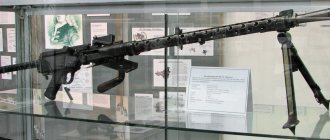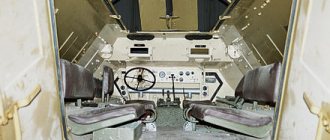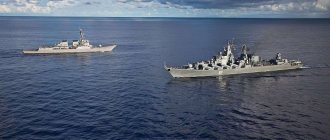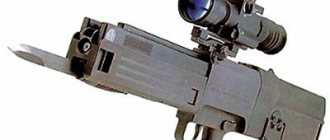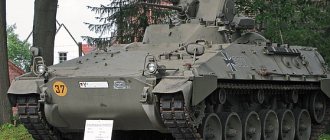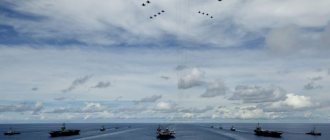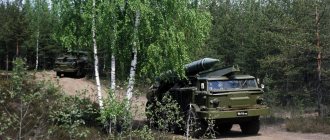In four months, the German army, the Bundeswehr, may no longer have special forces called Kommando Spezialkräfte (KSK): they are in danger of being disbanded. In this case, one company of German special forces will be disbanded immediately. In addition, this entire elite unit will stop participating in maneuvers and international missions, and the task of training its personnel will be assigned to another army unit. The German military counterintelligence (MAD) is also awaiting a serious audit with possible organizational conclusions.
The German Defense Minister reacted harshly
These are the consequences of the loud military-political scandal that broke out in Germany. What happened was exactly what the democratic public of Germany, which had well learned the lessons of German history, had always feared: the country’s armed forces fell, at least partially, under the influence of right-wing extremists and neo-Nazis. Hence the harsh reaction of German Defense Minister Annegret Kramp-Karrenbauer, who had already warned about the danger of right-wing radicalism in the Bundeswehr.
German Defense Minister Annegret Kramp-Karrenbauer
On June 29, she arrived at the KSK location and presented an ultimatum to the special forces personnel: either the military personnel remain part of the problem or become part of the solution. Specifically, this means that they received a probationary period until October 31 to prove the ability to “self-cleanse” their ranks. If this does not give the desired result, this unit will be completely disbanded.
On June 30, the Ministry of Defense informed the Bundestag in writing about the planned reform. It was developed on the basis of a 55-page report presented by Annegret Kramp-Karrenbauer by a working group created by her order on May 29. On July 1, the Minister of Defense came to a meeting of the parliamentary defense committee.
Bundeswehr - parliamentary army
The fact is that Germany has a parliamentary army; this distinguishes the Bundeswehr from presidential armies in many other countries, where the commander-in-chief, who gives orders for the use of troops, is the head of state. And in Germany, and this is due to the country’s historical experience, the use of armed forces outside the territory of the NATO bloc is possible only with the permission of parliament.
Soldiers of the German special forces KSK during an exercise in Germany
Accordingly, the Minister of Defense is obliged to coordinate many issues related to defense policy with deputies, who, in turn, have the right to demand detailed information about the state of affairs in the army.
On July 1, after a meeting with deputies, Annegret Kramp-Karrenbauer gave a press conference at which she explained what emergency measures would be taken regarding KSK and why they were necessary. At the same time, she emphasized that the overwhelming majority of the unit’s fighters are faithful to the constitutional order of Germany. At the same time, she noted that a kind of elitism arose in the special forces, isolation from other parts of the Bundeswehr, which contributed to the spread of radical sentiments.
Right-wing special forces soldiers with connections to MAD
The trigger for the current events was a search conducted by police in May in the East German state of Saxony on the land of a KSK soldier. A secret warehouse of weapons and ammunition was discovered there. It was after this that the Minister of Defense created a working group designed to thoroughly understand all the circumstances of this emergency. Moreover, alarming signals related to special forces personnel have been multiplying since April 2017.
KSK emblem on the beret of one of the servicemen
Then the soldiers of the 2nd KSK company gave a farewell to one of their commanders and during this party, according to some accounts, they listened to the music of right-wing radical rock bands, raised their hands in the Nazi salute (yawned) and had fun throwing severed pig heads at each other . It is this company that will now be unconditionally disbanded.
In January 2020, military counterintelligence MAD reported that 20 KSK soldiers were suspected of right-wing views. Compared to the total strength of the unit, this is five times more than the average in the Bundeswehr. Later, a shadow fell on MAD itself: reasonable suspicions arose that its employees informed special forces soldiers about the progress of the investigations.
And it became quite alarming after it became clear that the Bundeswehr currently cannot explain where a total of 85 thousand rounds of ammunition and 62 kilograms of explosives went from its arsenals. Therefore, now the troops will take an inventory of all property. It remains to be seen whether this is due to negligence or malice.
Special forces: why does Germany need them?
With all this, Annegret Kramp-Karrenbauer leaves no doubt that Germany needs special forces, and therefore the possible complete disbandment of a particular KSK unit does not at all mean a fundamental abandonment of this kind of highly professional units. They, the Minister of Defense recalls, are needed, in particular, for the release of German citizens held hostage in war zones.
Actually, it was for this purpose that the KSK special forces were created in 1996, and the DW media company played a key role in this. During the civil war in Rwanda, which in 1994 escalated into genocide of one of the local population groups, German citizens, employees of the Deutsche Welle radio station (Deutsche Welle), who worked in the city of Kigali at a relay station, were in mortal danger. At the request of the German government, they were taken out of this African country by Belgian paratroopers, since German units trained to perform such tasks simply did not exist at that time.
True, according to media reports, the KSK army special forces, created under the impression of these events, did not have to free the hostages - unlike the GSG-9 police special forces. However, special forces soldiers have repeatedly participated in operations in Afghanistan and in training local personnel, for example, in Jordan.
See also:
Farewell to Afghanistan: 13 years of ISAF mission
First military mission outside Europe
On January 11, 2002, the first 70 German troops arrived in Kabul. Thus began the first non-European combat operation of the Bundeswehr. At the height of the ISAF mission, up to 5,350 Bundeswehr personnel were based in Afghanistan. Germany contributed the third largest military contingent after the United States and Great Britain to the international ISAF force.
Farewell to Afghanistan: 13 years of ISAF mission
Content
- 1. History
- 2 Structure
- 3 Compulsory military service
- 4 Organization 4.1 Ground Forces
- 4.2 Naval forces
- 4.3 Air force
- 4.4 Cybernetic and information space
- 4.5 Joint support forces
- 4.6 Health service
Responsibility for northern Afghanistan
The Bundeswehr was deployed in a relatively calm region in the north of the country. Thus, it was possible to soften criticism in Germany itself and at the same time fulfill the expectations in the world associated with the participation of the Bundeswehr in the ISAF mission. Since October 2003, German soldiers have been based in Kunduz province. In 2006, Germany assumed primary responsibility for stability in northern Afghanistan.
Farewell to Afghanistan: 13 years of ISAF mission
Structure
The Saxony-class frigates
of the Bundeswehr have a three-branch structure (Ground Forces, Air Force and Navy). Also, joint support forces and a health service were created as separate components within the Bundeswehr in 2000.
The Bundeswehr consists of armed forces and civilian administration. The head of the Bundeswehr is the Federal Minister of Defense, who is the commander-in-chief in peacetime. If defensive action becomes necessary, command passes to the German Chancellor (Article 115b of the German Constitution). The highest rank in the Bundeswehr is the rank of inspector general, who, although he holds the rank of general, is nevertheless not the commander of the Bundeswehr. The position of commander as such does not exist. Responsibility for the readiness of the relevant units of the Bundeswehr lies with inspectors of the military branches (Army, Air Force, Navy) and military control structures (joint support forces, medical service).
According to the adopted personnel model, the size of the Bundeswehr should be 204 thousand military and 75 thousand civilian by 2011. During the Cold War, the Bundeswehr numbered 500 thousand troops.
Since 2001, all restrictions on service for women have been lifted. Until that time, women had the right to serve only in medical and musical units. In 1994, Verena von Weymarn was awarded the rank of physician general, making her the first female general in German history. As of 2006, approximately 12 thousand women serve in the Bundeswehr. About half of them serve in sanitary units. Women make up approximately 6.2% of contract workers. In the Navy 8.4%, in the infantry 6.9% and in the Air Force 4.9%
Specific assistance to the population
Germany was the first NATO country to send specialists to the regional infrastructure reconstruction teams in Afghanistan (PRT). The restoration of civilian structures and armed security were understood as two sides of the same coin. Germany will provide financial assistance for the reconstruction of Afghanistan after 2014.
Farewell to Afghanistan: 13 years of ISAF mission
Notes
- Stärke: Militärisches Personal der Bundeswehr
- Parkhitko N.P. The evolution of German military policy after unification (inaccessible link) Bulletin of MGIMO (U), No. 5(14), 2010
- Compulsory military service Archived October 24, 2013 on the Wayback Machine
- Ionova E.P. Geopolitical aspects of the presidential elections in Uzbekistan // Russia and the new states of Eurasia. — 2020. — No. 2 (27). — P. 105
- The German Air Force has a military base in Uzbek Termez
- Press conference of His Excellency Franz-Josef Overbeck; Press conference - Bischof Dr. Franz-Josef Overbeck
- Appointment of the head of the military ordinariate for Germany; NOMINA DELL'ORDINARIO MILITARE PER LA REPUBBLICA FEDERALE DI GERMANIA Archived copy of February 23, 2012 on the Wayback Machine
- Regimental imams will appear in the German army
Black day
On September 4, 2009, German Colonel Georg Klein requested a NATO airstrike against two fuel tankers stolen by the Taliban in Kunduz province. As a result, more than 90 civilians, including children, were killed. The investigation in Germany into suspicion that Colonel Klein committed a war crime was closed.
Farewell to Afghanistan: 13 years of ISAF mission
Careless statements by the federal president
On May 22, 2010, German President Horst Köhler brought down a storm of criticism in Germany with a statement made on a plane on the way back from Afghanistan. He justified the participation of the Bundeswehr in the ISAF mission, including the economic interests of Germany. Shortly after this announcement, Köhler resigned.
Farewell to Afghanistan: 13 years of ISAF mission
Organization
Ground troops
Main article: German Land Forces
Organizationally, the ground forces ( Heer
) consist of subunits (squad, platoon, company), units (individual battalion, regiment), formations (brigade, division, corps) and formations (individual corps, army, front). The ground forces include various types of troops, special troops and services. In total, the ground forces include: 23 brigades (nine deployed mechanized, two airborne, two logistics, mountain infantry, air-mechanized, army aviation, artillery, engineering, air defense, RCBZ troops and three mechanized reduced strength); Special Forces Command; German component of the Franco-German brigade.
Naval forces
Main article: German Navy
Navy _
) include: navy, naval aviation and special forces units (Marine Corps, SEK M). The leadership of the naval forces is carried out by the inspector of the navy through the main headquarters of the navy. Operational command and central control are subordinate to him. The Navy is the main component and basis of Germany's maritime potential, one of the instruments of the state's foreign policy and is intended to ensure the protection of the interests of Germany and its allies in the World Ocean by military means, maintaining military-political stability in the adjacent seas, and military security from the seas. and ocean directions.
Air Force
Main article: German Air Force
Air Force ( Luftwaffe
) is headed by an inspector who directs them through the main headquarters of the Air Force. The total strength of the Luftwaffe is 34 thousand military personnel, consisting of: four divisions, including one reconnaissance division, four fighter-bomber divisions, three fighter squadrons and four air defense squadrons, four operational control areas and an installation cover battalion; the military transport aviation command, which includes three military transport aviation squadrons and the air transport group of the German Ministry of Defense; Air Force Operations Command; two logistics support regiments and a weapons maintenance center.
Cybernetic and information space
Main article: German cyber and information space
Cybernetic and information space ( Cyber- und Informationsraum
) is headed by an inspector with the rank of lieutenant general. This is the newest category of forces of the Bundeswehr, recreated on April 5, 2020 from units that until then were part of the Joint Support Forces, such as communications, electronic warfare and reconnaissance units, psychological operations and topographic support.
Joint Support Forces
Main article: German Joint Support Forces
Joint Support Forces ( Streitkräftebasis
) is headed by an inspector with the rank of Deputy Inspector General of the Bundeswehr. With the completion of the formation of the CBO, it is planned to assign them the tasks of management, support and training. Among the most important functions of the new component of the Armed Forces are the following: operational management, centralized support, information processing, ensuring the defense of national territory, and maintaining centrally subordinate warehouses.
Health service
Main article: German Health Service
Health service ( Zentrale Sanitätsdienst
) The Bundeswehr is headed by an inspector, who has about 23 thousand military personnel at his disposal. The operational command of the medical and sanitary service is subordinate to the operational command of the MSS and four military districts. In April 2001, the formation of the central management of the MSS began.
Gradual withdrawal of troops
By the end of 2014, the Bundeswehr, in agreement with its NATO partners, will completely withdraw its troops from Afghanistan. Back in 2010, German soldiers left the province of Badakhshan, and a year later - the province of Kunduz. Bundeswehr military bases were transferred to the Afghan armed forces. The German base near the city of Mazar-i-Sharif was the main Bundeswehr field camp in northern Afghanistan until the end of 2012.
Farewell to Afghanistan: 13 years of ISAF mission
German media reported the critical condition of the Bundeswehr
The Federal Office for Armaments, Information Technology and Operations (BAAINBw), responsible for equipping the Bundeswehr, accidentally disclosed secret data during the acquisition of heavy helicopters worth 5.6 billion euros. The information was mistakenly sent not to the selected suppliers, but to all tender participants. As Die Welt writes, this was evidence of the critical state of the German army.
The article indicates that the department in Koblenz is now in a nervous and tense situation.
It has more than 10 thousand employees, whose main task is to equip the German armed forces with effective and reliable equipment.
The author of the article, Thorsten Jungholt, called for decisive action against this department, since “inexplicable errors” constantly occur during procurement in Koblenz.
He cited the example of helicopters that had been planned to be replaced for ten years. The Bundeswehr is armed with 71 Sikorsky CH-53 helicopters. They were put into operation in the 1970s, so it is not surprising that only 16 were operational last year.
Now the Bundeswehr has revealed state secrets, transferring them to defense concerns around the world.
The editor-in-chief of the Arsenal of the Fatherland magazine, military expert, reserve colonel Viktor Murakhovsky said that the main problems of the army, which were identified by a special inspection, were recently discussed at a hearing in the Bundestag.
According to him, the level of combat effectiveness of the equipment equipped by the Bundeswehr turned out to be extremely low. This was especially true for new types of equipment. He also told FAN
about the situation with the new MH-90 helicopters, when only 20% of the equipment could take off. The expert emphasized that such situations also arose with armored vehicles and aircraft.
The German military believes that such cases are associated not only with insufficient funding, but also with personnel problems, Murakhovsky noted.
“Technical specialists are not very keen on military service. Let me remind you that the Bundeswehr is a contract army. Thus, there is a general problem with the desire of young people to serve in the ranks of the Bundeswehr. The Bundeswehr is not competitive in the German labor market. The lack of interest in the Bundeswehr among young people is explained by unclear political goals. It seems that, despite all the propaganda, the Germans understand that no one is going to attack them,” he emphasized.
The expert noted that the Bundeswehr participates in joint NATO operations, for example, in Afghanistan. In addition, the level of salaries and social support offered by the Bundeswehr does not compete with other sectors of the German national economy, since for the same money you can work with much less risk, the expert explained.
Recently, reports about the deplorable state of the German army have been received especially often. The day before, the Bundeswehr announced that as a precautionary measure, the military decided to temporarily abandon the operation of Eurocopter Tiger combat helicopters due to a possible defect in the mounting bolts.
“Security is a priority for the Bundeswehr. For this reason, an order was received to suspend the use of Tiger combat helicopters,” the press release stated.
The German armed forces received information about the possible marriage from representatives of the military-industrial complex. It is expected that fasteners will need to be replaced to return to service.
Spiegel magazine clarified that the German Armed Forces have 53 Eurocopter Tiger helicopters.
The day before, the national parliament's defense commissioner, Hans-Peter Bartels, criticized the German fleet. He was indignant that the country's Navy had never “been smaller than it is now.” According to him, the fleet should consist of 15 frigates, and not eight, as at the moment.
On Monday, the Bild newspaper wrote that 42% of German Air Force pilots do not spend enough time in the air, thereby violating the requirements of the North Atlantic Alliance. NATO recommends that pilots practice 180 hours a year, but in Germany only 58% fulfill the norm - 512 out of 875 military personnel. The publication explained this phenomenon by the shortage of aircraft.
The last stronghold is the Marmol military base
The Marmol base was the place where many Bundeswehr soldiers said goodbye to Afghanistan. From there, military personnel were sent back to Germany. Marmol will remain the largest Bundeswehr base in Afghanistan after 2014. At the end of the ISAF mission, about 650 German instructors will be stationed in this camp, who will train and advise the Afghan army.
Farewell to Afghanistan: 13 years of ISAF mission
German military forces abroad
A group of German Navy ships patrolling the territorial waters of Lebanon.
In the city of Termez (Uzbekistan), Germany rents an air base, for which, as of 2020, it pays a rent of 35 million euros per year[4]. As of February 1, 2020, current operations abroad are carried out by the Bundeswehr in the following missions:
- Operation Resolute Support in Afghanistan - 808 people.
- Operation “Resolute Support” in Uzbekistan (Termez) - 808 people.[5]
- KFOR in Kosovo - 795 people.
- COUNTER DAESH in Syria - 426 people.
- Active Endeavor in the Mediterranean Sea - 272 people.
- EUTM Mali in Mali - 192 people.
- ATLANTA in Somalia - 111 people.
- UNIFIL in Lebanon - 108 people.
- Iraq (mainly training Kurdish Peshmerga fighters) - 98 people.
- UNMISS in South Sudan - 16 people.
- UNAMID in Sudan - 9 people.
- MINURSO (Western Sahara) – 4 people.
- UNMIL in Liberia - 3 people.
